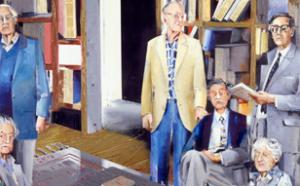
In “Sapiens: A Brief History of Humankind,” renowned historian and author Yuval Noah Harari takes readers on an extraordinary journey through the annals of time, unraveling the intricate tapestry of human history. Harari’s compelling narrative explores the evolution of Homo sapiens, from ancient foragers to the architects of the modern world.
The journey begins in the distant past, as Homo sapiens emerged on the African savannahs, coexisting with other human species such as Neanderthals and Homo erectus. Harari skillfully navigates through the Cognitive Revolution, a pivotal moment when the human mind evolved to create shared myths, beliefs, and stories. This revolution laid the groundwork for complex societies and cultural cooperation, distinguishing Homo sapiens as the dominant species on Earth.
Harari seamlessly guides readers through the Agricultural Revolution, a transformative period where humanity transitioned from nomadic lifestyles to settled agriculture. This shift brought forth unprecedented changes in social structures, economic systems, and the establishment of empires, marking the birth of civilization.
The author then delves into the uncharted waters of the Scientific Revolution and the Enlightenment, exploring how the quest for knowledge and reason propelled humanity into a new era of discovery. From the Renaissance to the Industrial Revolution, Harari examines the profound impact of human ingenuity on global dynamics, shaping societies and economies.
“Sapiens” further scrutinizes the ramifications of imperialism, capitalism, and the technological advancements of the 20th century, culminating in the challenges and opportunities of the present day. Harari’s insightful analysis prompts readers to contemplate the implications of artificial intelligence, biotechnology, and the potential trajectories of human evolution.
Harari’s narrative is both thought-provoking and accessible, seamlessly weaving together anthropology, sociology, and history. His exploration of cultural, political, and economic revolutions offers readers a panoramic view of the forces that have shaped the human experience.
Ultimately, “Sapiens” serves as a mirror reflecting the complexities of human existence. Harari’s prose invites readers to question assumptions, challenge preconceptions, and ponder the collective journey of Homo sapiens. As we navigate the ever-evolving landscape of our species, “Sapiens” stands as a testament to the enduring quest for knowledge and understanding that defines our shared human narrative.






